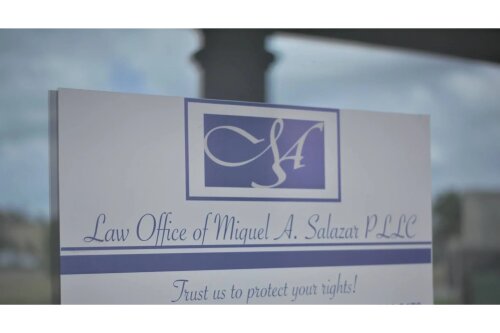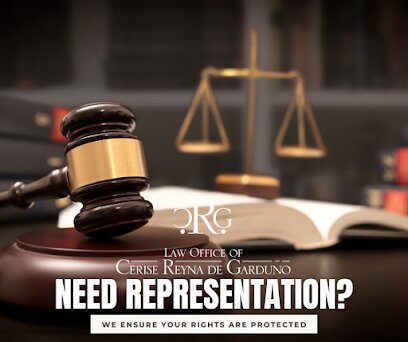Best Car Accident Lawyers in Brownsville
Share your needs with us, get contacted by law firms.
Free. Takes 2 min.
List of the best lawyers in Brownsville, United States
About Car Accident Law in Brownsville, United States
This guide explains key legal issues for people involved in car accidents in Brownsville, Texas. It covers why you might need a lawyer, important local and state rules that affect your case, common questions people ask, useful local resources, and clear next steps to protect your rights. The information is general in nature and is not a substitute for a consultation with a licensed attorney who can advise you about your specific facts and circumstances.
Why You May Need a Lawyer
Many car-accident cases can be handled directly with insurers, but there are common situations where legal help is important. If you suffer significant injuries, have high medical bills, have long-term impairment, or face lost wages, a lawyer can help quantify damages, negotiate with insurers, and push for fair compensation. If the other driver is uninsured or underinsured, if multiple parties are involved, or if government entities or commercial vehicles played a role, an attorney can protect your claim and identify all potential sources of recovery. A lawyer is also helpful when fault is disputed, when complex liability issues arise, or when insurers try to minimize or deny claims. Finally, if you face a lawsuit or need to file suit because negotiations fail, an attorney will handle court procedures, deadlines, and trial strategy.
Local Laws Overview
Brownsville is in Cameron County, and car accident claims there are governed primarily by Texas law along with local enforcement and court procedures. Key legal points to know include the following.
Fault and comparative negligence - Texas follows a modified comparative negligence system. If you are found 51 percent or more at fault for the crash, you cannot recover damages. If you are less than 51 percent at fault, your recoverable damages are reduced by your percentage of fault.
Insurance requirements - Texas requires minimum liability insurance amounts of 30,000 dollars for bodily injury per person, 60,000 dollars for bodily injury per accident, and 25,000 dollars for property damage per accident. These minimums often do not fully cover serious injury claims, so uninsured or underinsured motorist coverage and health insurance can be important.
Crash reporting and duties at the scene - Drivers must stop, render aid if possible, and exchange information after an accident. Texas law requires a crash report in certain situations, such as when an injury or death occurs or when property damage exceeds a statutory threshold. Police and law enforcement in Brownsville and Cameron County may investigate and prepare crash reports that are important evidence.
Statute of limitations - In Texas, the general deadline to file a personal injury lawsuit is two years from the date of the accident. The same two-year limit usually applies to wrongful death claims, with some exceptions that may extend or shorten deadlines in specific circumstances. Missing the statute of limitations can bar your right to sue, so act promptly.
Traffic safety and violations - Seat belt, child restraint, and distracted driving laws in Texas can be relevant to fault and damages. Driving under the influence laws and commercial vehicle regulations also affect liability analyses in many Brownsville crashes.
Local courts and filing - Small-value disputes and some traffic matters may be handled in Justice of the Peace courts. Larger civil claims are typically filed in county or district courts in Cameron County. Local practice, filing requirements, and deadlines can differ from other parts of Texas, so local counsel often helps avoid procedural errors.
Frequently Asked Questions
What should I do immediately after a car accident in Brownsville?
First, check for injuries and call 911 for emergency medical help if needed. Move to a safe location if possible. Exchange names, contact information, insurance details, and vehicle information with other drivers. Get the responding police report number and officer name. Take photos of vehicles, scene, license plates, visible injuries, and road conditions. Collect witness names and contact information. Seek medical evaluation even if you feel OK, because some injuries appear later. Notify your insurer promptly and preserve evidence such as photos and receipts.
Do I need a lawyer for a minor fender-bender?
Not always. For minor property-damage-only crashes where liability is clear and damages are small, handling the claim directly with insurers may be sufficient. However, even some seemingly minor crashes lead to delayed medical problems or hidden damages. If you have any injury, ongoing pain, dispute over fault, or trouble with an insurer, consult an attorney for a free or low-cost evaluation to understand your options.
How is fault determined after a crash?
Fault is determined using available evidence: police crash reports, photos, videos, witness statements, vehicle damage patterns, driver statements, traffic laws, and expert analysis when needed. Insurers investigate and assign a percentage of fault. In disputed cases, an attorney can gather additional evidence, hire reconstruction experts, and, if necessary, litigate to establish fault in court.
What types of damages can I recover in a car accident case?
Recoverable damages typically include economic damages such as medical bills, future medical expenses, lost wages, and property damage. Non-economic damages may include pain and suffering, mental anguish, loss of enjoyment of life, and loss of consortium. In rare cases involving egregious conduct, punitive damages may be available under Texas law, but those claims have specific legal standards and limits.
How long do I have to file a lawsuit after an accident?
The general statute of limitations for personal injury in Texas is two years from the date of the accident. There are exceptions that might extend or shorten this period in particular situations, such as claims against government entities or cases where the injury was not discovered immediately. Because deadlines can be strict, consult a lawyer promptly to preserve your rights.
What if the at-fault driver has no insurance?
If the at-fault driver is uninsured, your options include using your uninsured motorist coverage if you have it, pursuing the driver personally for damages, or using health insurance to cover medical costs while pursuing reimbursement. Underinsured motorist coverage can help when the at-fault driver has insufficient limits. A lawyer can identify available coverages and pursue the most effective route to recovery.
Will my insurance cancel me for filing a claim?
Not usually for being a victim. Filing a claim as an injured party should not, by itself, lead to cancellation. However, insurers may raise rates after at-fault claims, traffic violations, or repeated claims. Read your policy, keep records of communications, and consult an attorney if an insurer treats you unfairly or attempts to deny coverage improperly.
Can I accept a quick settlement offer from the insurance company?
Be cautious. Insurers often make early settlement offers that are less than the full value of your claim. Accepting a settlement usually requires signing a release that prevents further recovery for the same injury. Before accepting any offer, get a clear accounting of current and expected future medical costs, lost income, and non-economic losses. Consider at least consulting a lawyer to evaluate the offer.
What if I was partly at fault for the accident?
Under Texas modified comparative negligence, you can still recover if you are less than 51 percent at fault. Your recovery is reduced by your percentage of fault. For example, if your damages are 100,000 dollars and you are 20 percent at fault, your recoverable damages would be 80,000 dollars. If you are 51 percent or more at fault, you generally cannot recover damages.
How much does a car accident lawyer cost in Brownsville?
Many personal injury attorneys work on a contingency-fee basis, meaning they take a percentage of the recovery only if you win or settle. Typical contingency fees vary depending on the stage of the case, the complexity, and whether the matter goes to trial. You should get fee terms in writing and ask about costs that may be advanced for your case, such as expert fees or court costs. Many attorneys offer a free initial consultation to evaluate your claim.
Additional Resources
Brownsville Police Department - For crash reports and local law enforcement contact. Cameron County Sheriff - For county-level investigations and assistance. Brownsville Municipal Court and Cameron County District Clerk - For traffic citations, civil filings, and court records. Texas Department of Public Safety and Texas Department of Transportation - For statewide crash report information and transportation safety resources. Texas Department of Insurance - For questions about insurance practices and consumer complaints. Texas RioGrande Legal Aid - Provides legal assistance and resources for qualifying individuals in the Rio Grande Valley region. State Bar of Texas - Use the lawyer referral and information services to find licensed attorneys in Brownsville who handle car-accident and personal injury cases. Local hospitals and medical providers - For urgent care, emergency treatment, and medical records needed to document injuries. Community health and victim assistance programs - For counseling, medical advocacy, and support services; these may be available through local health providers or nonprofit organizations in the Brownsville area.
Next Steps
1. Prioritize safety and health - Seek immediate medical care for any injury and follow up with recommended treatment. Document all visits and keep receipts and records.
2. Preserve evidence - Keep photos, witness contact information, the crash report number, repair estimates, medical records, and any correspondence with insurers or other parties.
3. Notify your insurer - Report the accident to your insurance company promptly, but avoid giving recorded statements or signing authorizations before consulting a lawyer if liability or injuries are contested.
4. Get a copy of the police crash report - Request it from the Brownsville Police Department or the appropriate agency handling the report.
5. Consult a local, experienced car-accident attorney - Many offer free consultations and work on contingency. A local attorney familiar with Cameron County courts, Brownsville judges, and local insurers can evaluate your claim, explain likely outcomes, and advise on settlement versus litigation strategies.
6. Ask the right questions when choosing an attorney - Ask about experience with similar cases, contingency-fee terms, litigation history, communication practices, available resources for investigation, and whether bilingual services are available if needed.
7. Act before deadlines - Because statutes of limitations and special notice rules can bar claims, do not delay in seeking legal advice if you believe you may have a case.
For help specific to your situation, consult a licensed attorney in Brownsville. This guide provides general information to help you understand the process and make informed next steps, but only a lawyer who reviews your facts can give legal advice tailored to your case.
Lawzana helps you find the best lawyers and law firms in Brownsville through a curated and pre-screened list of qualified legal professionals. Our platform offers rankings and detailed profiles of attorneys and law firms, allowing you to compare based on practice areas, including Car Accident, experience, and client feedback.
Each profile includes a description of the firm's areas of practice, client reviews, team members and partners, year of establishment, spoken languages, office locations, contact information, social media presence, and any published articles or resources. Most firms on our platform speak English and are experienced in both local and international legal matters.
Get a quote from top-rated law firms in Brownsville, United States — quickly, securely, and without unnecessary hassle.
Disclaimer:
The information provided on this page is for general informational purposes only and does not constitute legal advice. While we strive to ensure the accuracy and relevance of the content, legal information may change over time, and interpretations of the law can vary. You should always consult with a qualified legal professional for advice specific to your situation.
We disclaim all liability for actions taken or not taken based on the content of this page. If you believe any information is incorrect or outdated, please contact us, and we will review and update it where appropriate.











